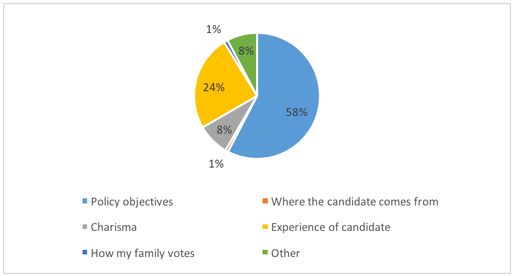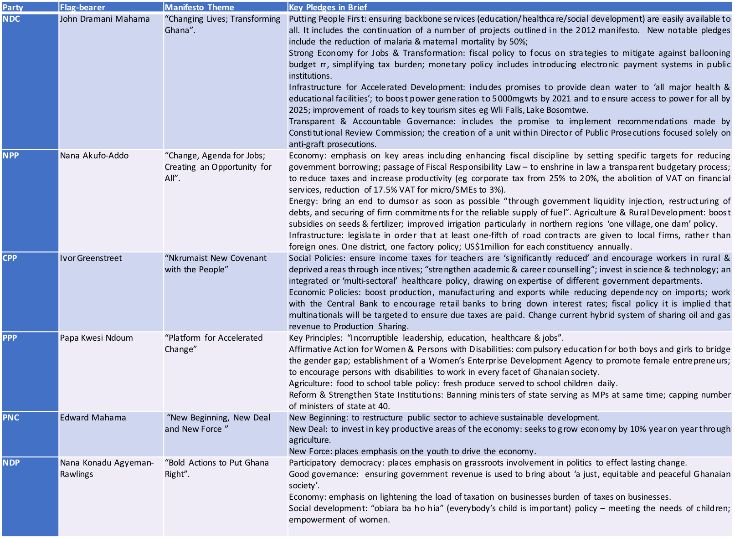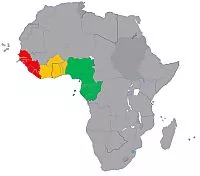In the run-up to Ghana's 7 December 2016 elections, Songhai Advisory conducted a survey from among Ghanaian voters to gauge popular sentiment in what many are predicting will be a closely contested race between the party in government, the National Democratic Congress (NDC), and the major opposition party, the New Patriotic Party (NPP) and their flag-bearers.
Headline Findings
- Issues over identity: Identity, particularly ethnicity, is an important organising principle in Ghana. The north and the Volta region are associated with the ruling NDC, the southern Akan regions with the opposition NPP for the most part. Moreover, the two major parties have traded accusations of tribalism in this campaign. However, survey respondents put emphasis on policy objectives over place or personality when asked what would motivate their choices at the ballot. And indeed, while tribe has featured on occasion, comments have lacked the venom of 2012 for the most part. The overarching environment i.e. macroeconomic volatility and recent uptick in infrastructural development set the scene for a policy oriented debate, it would seem.
- Security concerns: Nevertheless, an overwhelming majority of respondents described security as a concern and there are appeals for continued peace on the airwaves from across the political spectrum. This may reflect perceived weaknesses in institutions and process. Most respondents felt the elections would be very, mostly or fairly 'free and fair' but the 18% anticipating that polls would be 'not at all' free and fair constitute a significant minority. Elections in 2012 were followed by Supreme Court challenge and there have already been isolated violent incidents.
- Electoral process: As stated, a significant minority felt the elections would not be free and fair at all. Additionally, a much larger proportion of our respondents (almost 50%) felt that Ghana's judiciary cannot be relied upon. Unsurprising perhaps given the 2015 judicial scandals. Also, there are enduring concerns regarding the accuracy of the voter register. Some mechanisms have been tightened as against 2012 e.g. operational capability and fidelity of polling agents, courts for electoral disputes – but scepticism will remain until they are seen in operation.
Methodology in Brief
- The survey was conducted over the course of three days in the week preceding Ghana's elections to be able to gain an indication as to how people might vote as close to the elections as possible. It was disseminated electronically - mostly shared via the social media platform of Whatsapp (to friends, colleagues, associates, via various networks- including school alumni networks and religious groups) and also via email. Other people were spoken with at random on the streets of Accra. The total number of respondents was 252 of which 247 met our criteria question of being eligible to vote.
- Only the results given by the 247 respondents have been analysed within the context of this survey and will be referred to variously as the 'respondents'/ 'those eligible to vote'. It is important to bear in mind the source of the data as well as the characteristics of the respondents (see below). The survey findings are indicative only, and should be treated as such. While we recognise that there are limitations to this survey, we hope that it will provide some interesting points for reflection during this last phase of Ghana's pre-election climate.
- Over three quarters of eligible voters that we surveyed were between the ages of 18 and 45 and respondents were overwhelmingly male (79%). We received responses from people from across the 10 regions of Ghana although to varying degrees, with 25% coming from Greater Accra and only 2% hailing from the three northern regions and the Western Region, a key swing region in previous elections.
- In terms of professions, almost half of the eligible voters we surveyed can be grouped into the category of white collar workers (office/administrative roles), just over a quarter are blue collar workers (involved in manual labour) and the remainder can be clustered as pink collar (customer-service orientated).
Issues-Based Elections v Personality Politics?
Understanding the electorate and the issues that motivate voters is crucial for any aspiring candidate or party seeking power. For the majority of respondents (58%), the policy objectives put forward by candidates is of chief importance when deciding who to vote for. This could explain the similarly high proportion of respondents who said they had read party manifestos: 61% (see Appendix). Experience was the second-most important consideration among pollsters, with charisma and family voting patterns left trailing behind. None of the respondents felt that where the candidate comes from is an important factor when choosing who to vote for, which is extremely interesting to note, given that the vote in Ghana has typically been along ethnic lines.

Figure 2. What is important to you when choosing who to vote for?
According to a recent World Bank report, in Ghana, the problem of the job market is not so much that there is unemployment as it is about the scarcity of well-paid jobs1. The report highlights that it tends to be public sector jobs which are better paid than private sector work and that social security is 'consistently' provided to public sector workers, which is not the case with the private sector. Perhaps such considerations were at the forefront of respondents' minds when placing 'job creation' at the top of their wish list for the incoming government to address.
Eradicating corruption came next, with 19%. There has been a slew of corruption-related scandals of late, with the Attorney-General & Minister of Justice, Henrietta Brew Appiah-Oppong stating in March this year that the Economic and Organised Crime Office (EOCO) had investigated 186 cases in 2015 alone. Think tank, Imani Ghana, published a report in June, alleging that between 2012 and 2014, GHC5.9bn (US$1.5bn) is unaccounted for due to financial 'recklessness' across various state institutions, including ministries, departments and agencies2. Both healthcare and education were viewed as the joint third most important consideration for the new government, followed by supporting SMEs, infrastructure, water & sanitation.
Seemingly, respondents felt the NPP would be the most competent in meeting those needs (69%). While the vast majority of respondents displayed a reluctance to depart with social convention by saying that Ghana is not ready for a female president (85%), the sentiment of the remaining 15%, a significant minority, shows that this option is not completely implausible.
Confidence in Institutions
Confidence in the conduct of the elections was mixed, with almost half of the respondents considering that the elections will be 'fairly' free and fair. Only 4% were extremely confident in the process, while 18% had a bleak outlook, stating that the polls would not be free and fair at all. Just under one quarter of eligible voters thought that the Electoral Commission (EC) is not at all competent while a similar number of voters were 'very' confident of the institution's abilities.
For every person who thought that the judiciary is competent, there was one who said that it was not (48% each). But only 4% of respondents expressed no confidence at all in this arm of the state. Arguably, the election petition case in the aftermath of the 2012 elections –which lasted for close to eight months- may have helped on the one hand to inspire confidence in the court process. However, the subsequent emergence of what has been described as 'the biggest corruption scandal to have hit Ghana's judiciary3', led by award-winning undercover journalist Anas Aremeyaw Anas which uncovered the extent to which the various layers within the judicial service have been compromised through bribery, has no doubt undermined confidence in the judiciary's ability to maintain independence. This is indeed worrying because if there are challenges to the legitimacy of the results, doubts are cast over whether people would repose their trust in the courts or if they would seek justice through alternative means.
However, the institutions which did inspire confidence the most among respondents were the religious ones, which could be the result of the characteristics of the respondents (see above). Indeed, respect for government pales in comparison with the respect accorded to religious bodies according to these results: 20% and 54%, respectively. Out of the religious bodies that people respect the most are the church (26%), the mosque (15%) and religious other (13%). The chieftaincy holds sway with one in six of those that we polled.
Security
In our conversations with a number of different people in the run-up to the elections, a common phrase we encountered when enquiring about the security of the polls was that 'Ghanaians are peaceful' so there was nothing to be concerned about from a security standpoint. However, the Electoral Commission (EC) has highlighted 81 constituencies out of 275 which could be flashpoints for insecurity. Indeed, the vast majority of eligible voters expressed concern about security in the run-up to the polls (79%).
Outlook
While the results of this survey are indicative only, they paint an interesting picture of how a cross-section of Ghanaian voters feel presently about the imminent parliamentary and presidential elections.
These findings do appear to confirm the prevailing sentiment that the elections will be a two-horse race between the incumbent NDC and the opposition NPP. Perhaps in the future, a reform to the 'winner takes all' electoral system, in favour of proportional representation, may inspire greater confidence among voters that smaller parties could be a credible choice, but at present, that is not the case. The survey results show us that most of the respondents are not ready for a female president. However, with 15% saying that the nation is ready, this is a significant enough minority for us to pay attention to, particularly as popular discourse over the need for gender balance increases. Bread and butter issues are at the top of the list for Ghanaians, at a time when the economy has faced several setbacks with frequent dumsor, significant currency depreciation, rising living costs and ballooning public debt over the past four years.
Confidence in the electoral process is not high and there are concerns about security. It is critical therefore that greater efforts are made to ensure that the polls are efficiently coordinated on polling day to stave off the risk of the outcome being de-legitimised. Should the electorate feel cheated out of a free and fair poll, there is concern that the courts may not provide the same level of comfort that they provided in the aftermath of the 2012 elections. Respondents were equally divided over the competence of the judiciary, which could be a reflection of a wider sense of disenchantment with the court process against the backdrop of the 2015 judicial scandal. Thus, given the level of influence that religious bodies have in the country, these institutions may be required to step into the vacuum created by a lack of confidence in the traditional arms of government, particularly after the vote.
Appendix 1: Party Manifestos in Brief

Footnotes
[1] http://www.ndc.org.gh/images/2016-Manifesto.pdf [2] https://s3.amazonaws.com/ndpc-static/CACHES/PUBLICATIONS/2016/10/19/2016-NPP+manifesto-full.pdf [3] http://www.conventionpeoplesparty.org/?q=node/27 [4] rrhttps://s3.amazonaws.com/ndpc-static/CACHES/PUBLICATIONS/2016/10/19/PPP-2016-Manifesto-final-Sep.pdf [5] http://www.graphic.com.gh/news/politics/ndp-launches-manifesto.html
1 http://documents.worldbank.org/curated/en/237991477039577804/pdf/109384-PUB-PUBLIC-PUBDATE10-20-16.pdf
2
http://www.imaniafrica.org/wp-content/uploads/2016/08/IMANIFiscalRecklessnessReportVersion2.5.pdf
3 http://www.bbc.co.uk/news/world-africa-34452768
The content of this article is intended to provide a general guide to the subject matter. Specialist advice should be sought about your specific circumstances.




